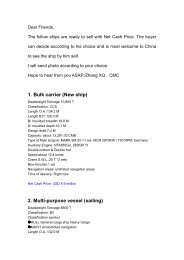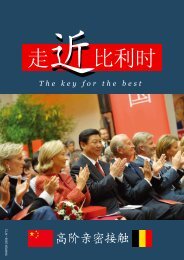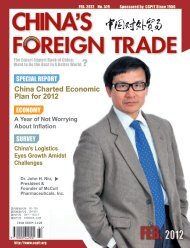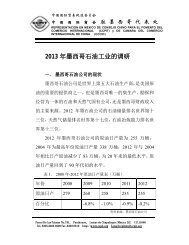F REIGN TRADE - 中国国际贸易促进委员会
F REIGN TRADE - 中国国际贸易促进委员会
F REIGN TRADE - 中国国际贸易促进委员会
You also want an ePaper? Increase the reach of your titles
YUMPU automatically turns print PDFs into web optimized ePapers that Google loves.
Why ChineseEnterprises’ Overseas InvestmentFails Sometimes?By Audrey GuoAccording to McKinsey’s report,67% of the domesticenterprises’ overseas investmentshave failed. Comparedwith other countries’ overseas investmentfailure proportion, is China’s67% high? Why does China have sucha high failure ratio? What kind of barriersdo the Chinese enterprises oftenencounter in transnational M&A andhow do they overcome these barriers?And how do Chinese enterprises dealwith those barriers? Mr. Tay WoonTeck, Director from Stone Forest CorporateAdvisory gave a detailed analysison Chinese enterprises’ efforts to goglobal.When the reporter asked whetherthis ratio is higher than that of otherdeveloped countries? Mr. Tay told thereporter that 67% was quite high, comparedto countries such as US, UK andSingapore. Mr. Tay said that the wholeM&A process was generally dividedinto three phases—preliminary phase,full investigation and negotiation phaseand post integration phase. Each andevery detail in every phase cannot beignored. Mr. Tay said, “the enterprisesin Europe and the US have detailedevaluation guidance and plans for everyphase whereas the Chinese enterprisesgenerally are not adequately preparedto undertake a comprehensive risk assessmentand investment evaluation ofthe target companies. They generallydo not conduct detailed analysis on theoperating synergies of acquisition andthe risk related to the acquisition. Theyalso do not spend sufficient time planningand organizing the appropriatelevel of resources to implement the postacquisitionintegration.Mr. Tay also pointed out that Chinaand the West differ greatly in negotiationstyle. “In negotiation among theBritish and Americans, they are morestructured and they focus on identifyingthe risks and operating synergies ofthe target companies. Chinese companiesgenerally look into how to achievea quick negotiation and didn’t spendenough time examining the risks andoperating synergies of the acquisition.Mr. Tay advised that the Chinese companiesbe better prepared and shouldspend more time examining the operationsand management qualities of thetarget companies.During the post-acquisition andintegration phase, Mr. Tay advised thatthe Chinese enterprises should spendmore time to understand and complywith the local rules, laws and regulationsand spend more time to build alocalized management team that canunderstand and deliver the vision of theChinese enterprises. He explained thatthe failure of some M&A cases lies innon-compliance by the Chinese enterpriseswith the local laws and regulations.At last, he stressed that it is importantfor the Chinese entrepreneursto look into how to decentralize powerto an appropriate degree to allow for innovation.He said, “It’s easier said thandone, but it’s a challenge for many domesticenterprises to go global.”27

















